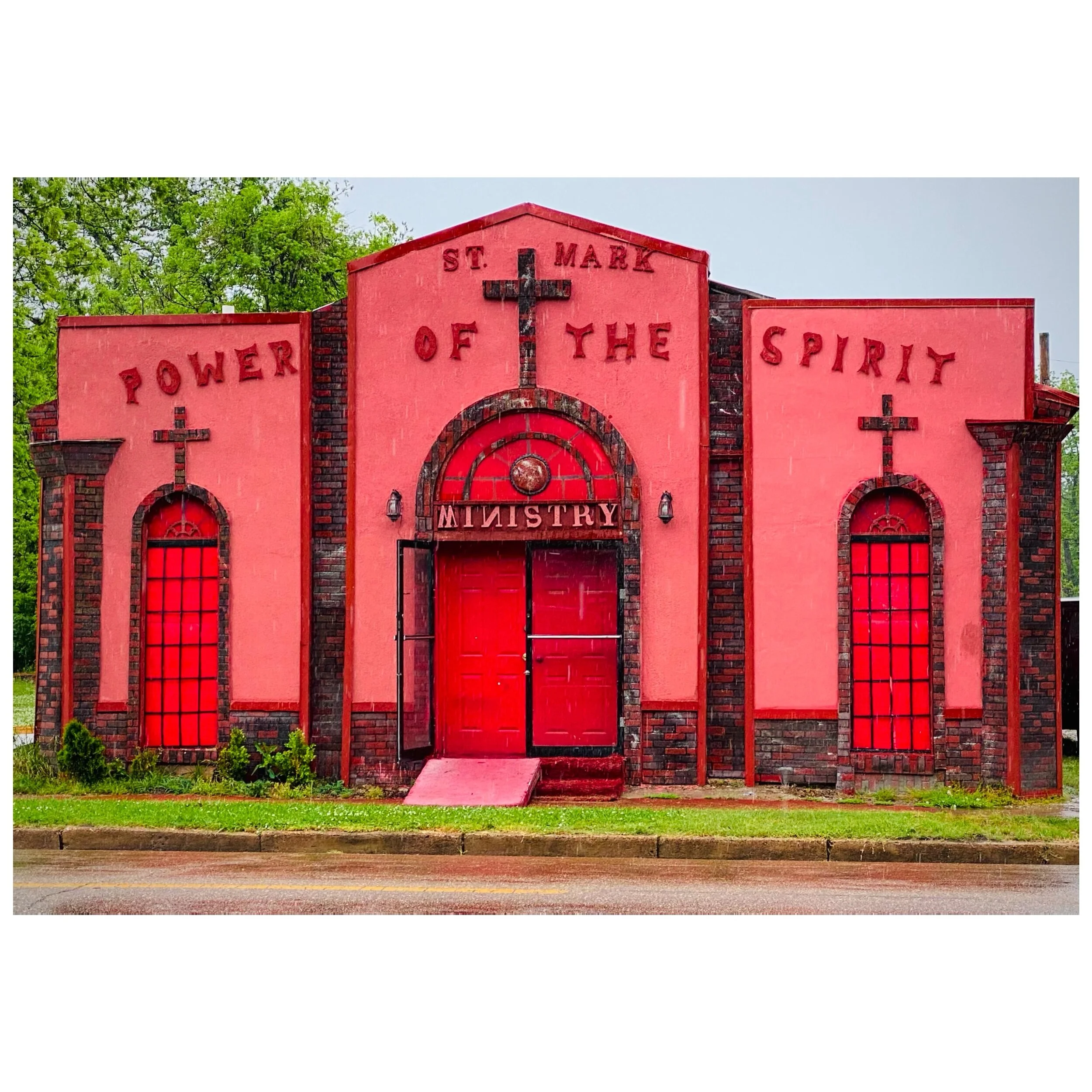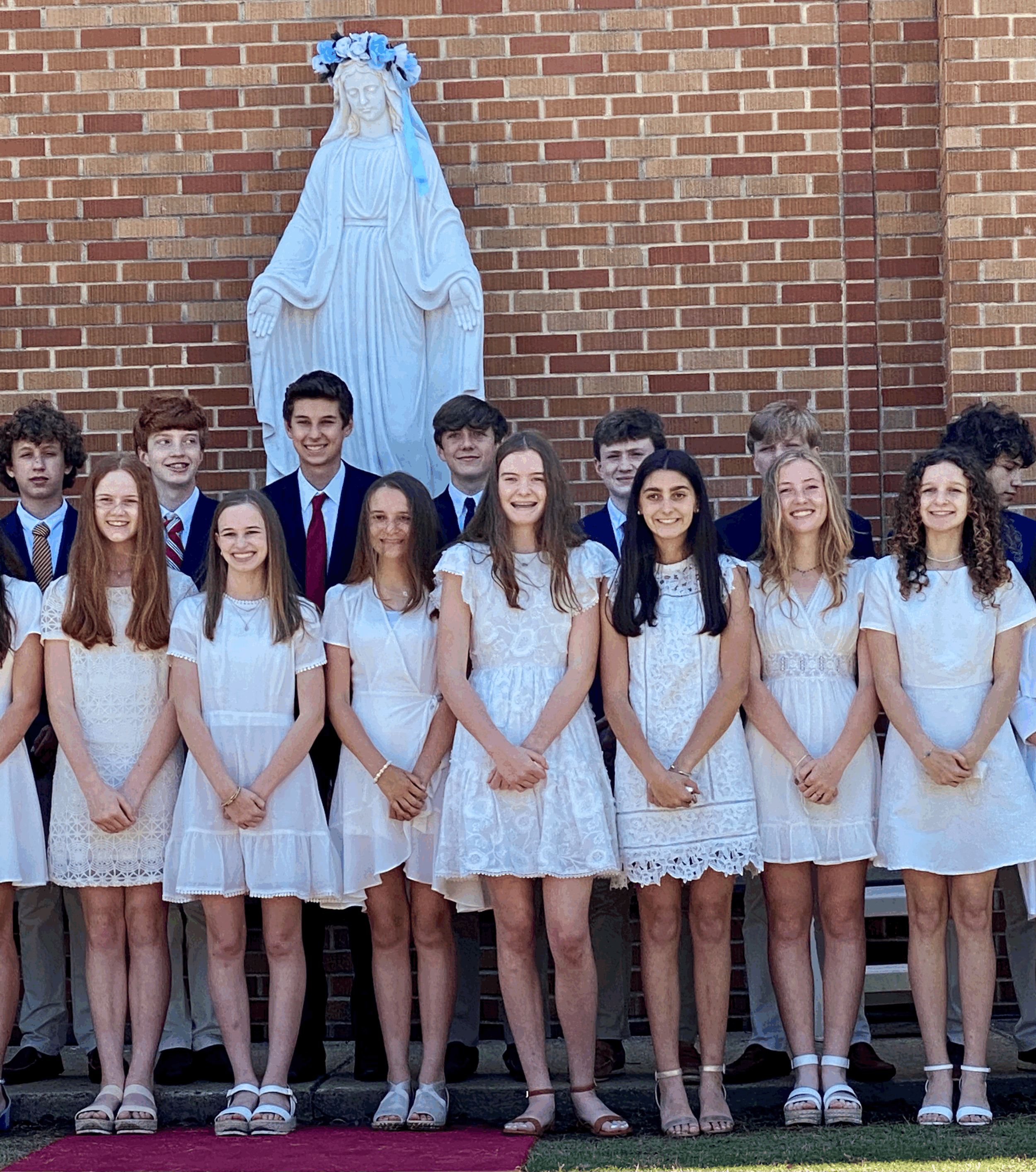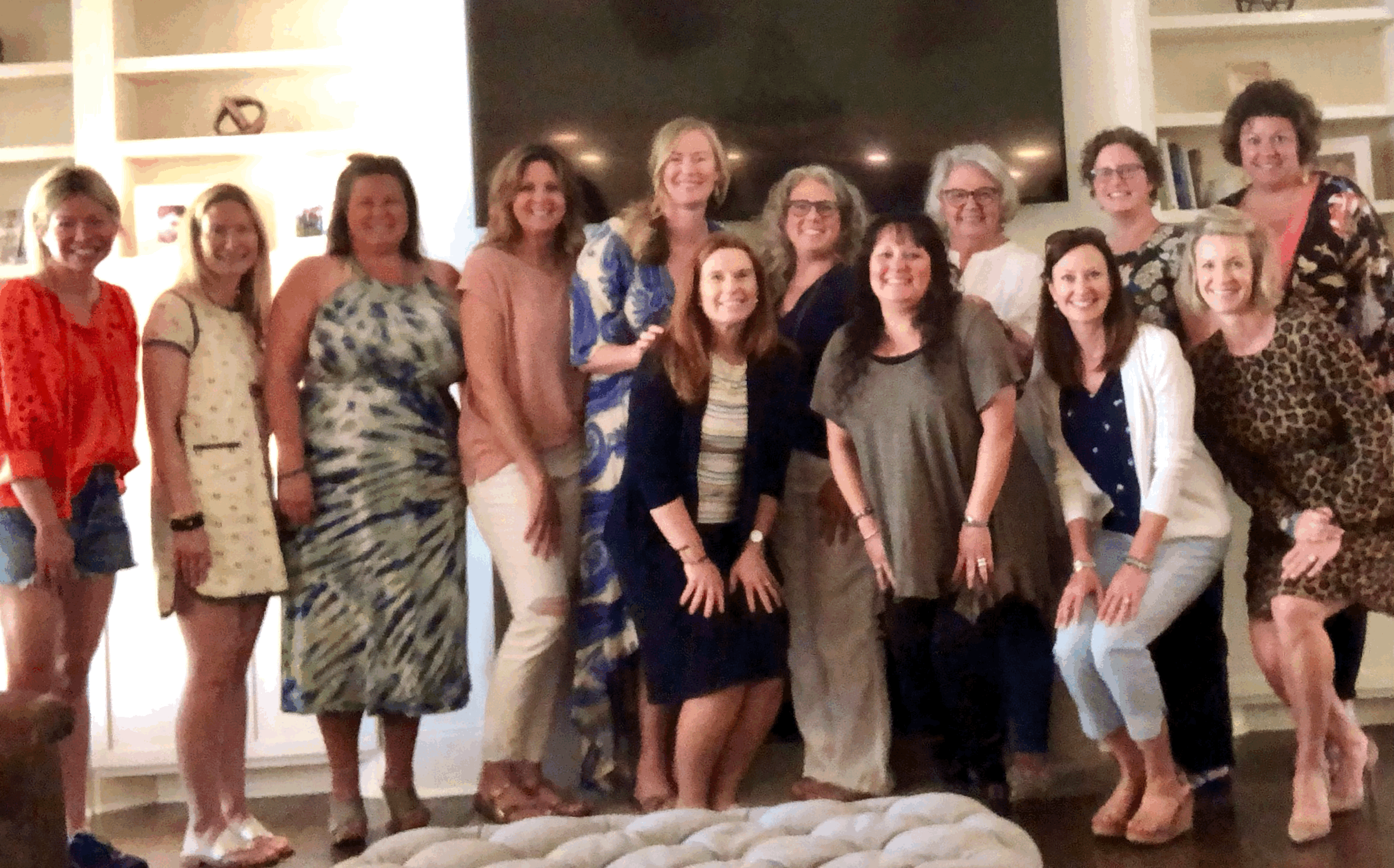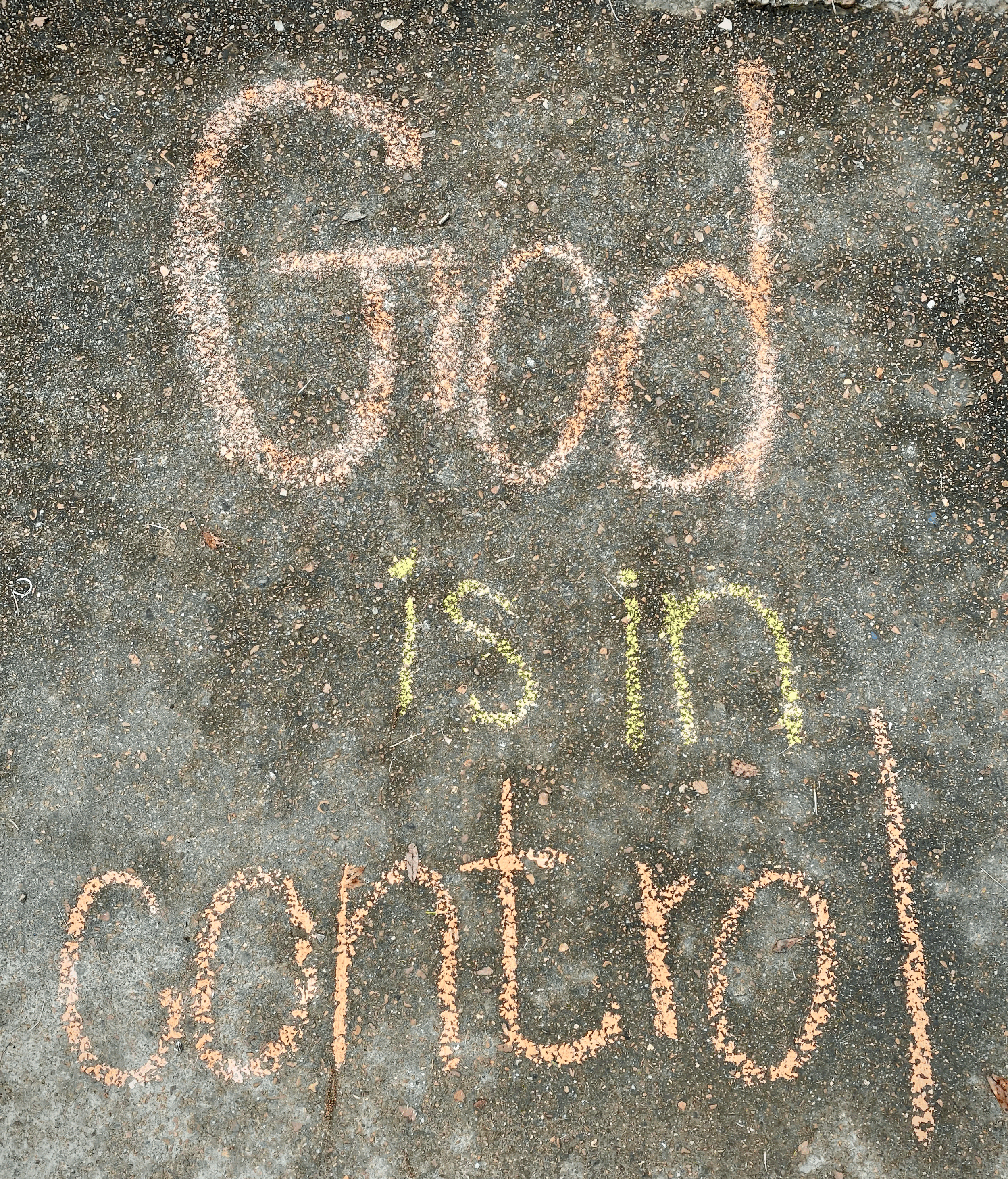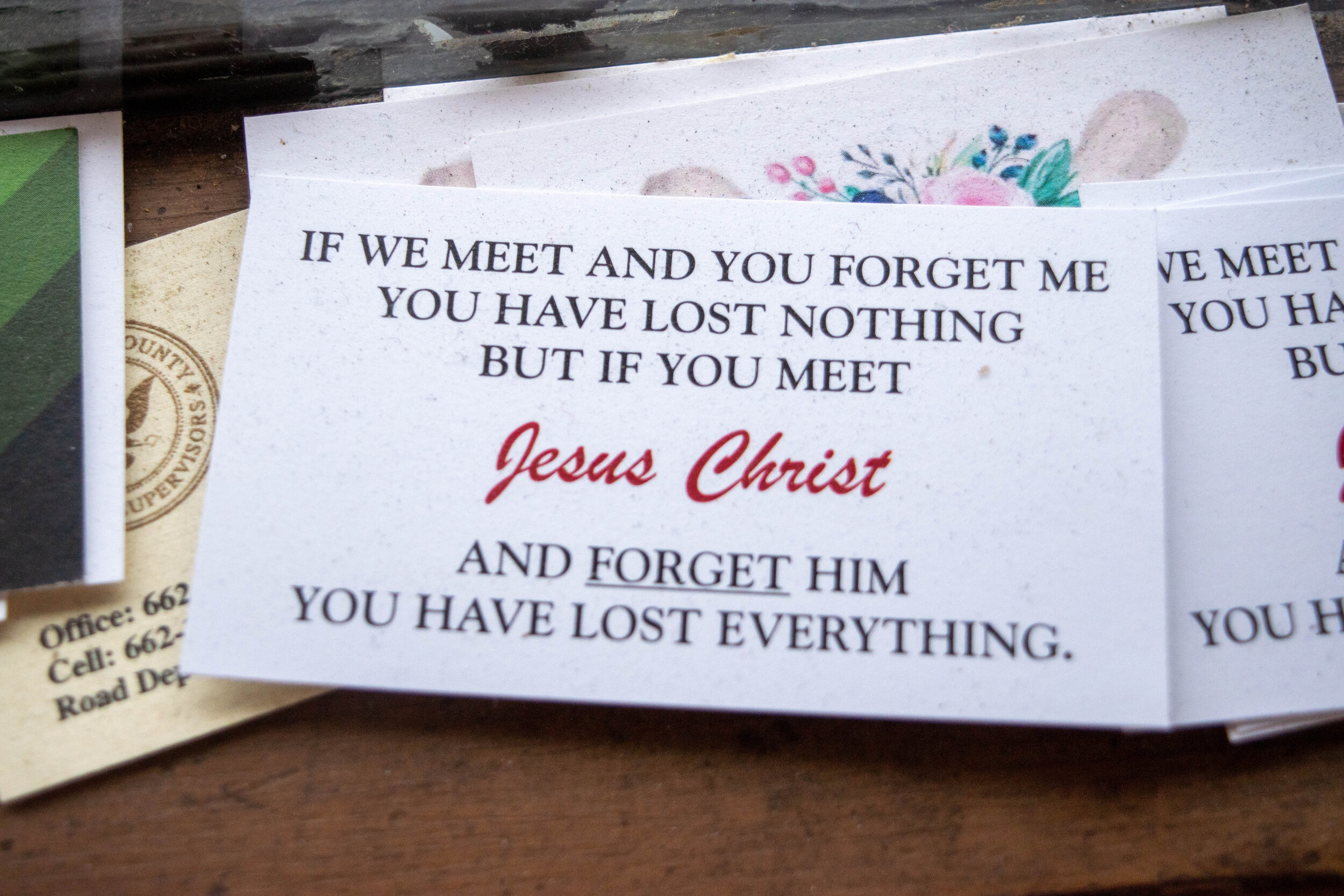To Believe is to Receive?
Church in Clarksdale, Mississippi
A note about this post:
I wrote most of it at the end of April, while I was still living in the Bible Belt of the US, where religion is prominent and overt. The month of May became extraordinarily busy with our departure from the US, so I never finished the post. Now that I’m home in Australia and making some additions and tweaks, it feels much scarier posting these thoughts - it’s too close to home and to the (mostly) secular society we live in. But it’s probably all the more reason to post them. What is stopping me - fear - fear of being judged, fear of being disliked, fear of being rejected? Well, I talk about all of these things in this post…..best I just push ‘publish’ and be done with it. Here goes…
I’m in a quandary. I think it’s one of those mid-life ones where you really question everything you were brought up to believe. I’ve been doing this for a while now, as you’d know if you’ve read any of my past blog posts, particularly this one Mississippi Soul, but I’m really grappling with one particular area right now - and that’s religion and spirituality. You see, contrary to what I would have thought a few years ago, if someone was to ask me what one of my favourite experiences in moving to Memphis has been - besides the travel it has allowed me to do and the friendships I have made - it would have to be the two programs of Bible Studies I have completed. Surprising, yes! It’s pulled me out of my dormant slumber of relative detachment from the Catholic Church over the last 30 years, and has shaken me with a force that I can no longer ignore.
I’m a ‘cradle Catholic’ - ie born into a Catholic family as opposed to converting to the faith - and I attended five years at a very strict Boarding High School that was run by nuns - the Loreto Sisters of the Institute of the Blessed Virgin Mary. We attended Mass two times a week and Chapel each morning, and we each undertook community service hours throughout the year. We learnt many Bible Stories, completed Sacraments, and were taught the importance of mission work; but I don’t remember delving deeply into Bible scripture. Whilst I found purpose in much of what we were doing (community service particularly), once I finished school, there was a feeling that Catholicism was thrust upon me, and I started to question much about it. There were just so many rules and regulations to follow, which were in conflict to how we (many friends felt the same way), as young adults, were trying to find our way in the world. With everything we were starting to hear about the institution that is the Catholic Church as well, I couldn’t see how it was going to fit into my future life - or at least life in my 20s.
I became what people in the US call a ‘cafeteria Catholic’ - those who assert a Catholic faith yet dissent from one or more doctrinal or moral teachings of the Catholic Church. Often the term is used by conservative Catholics critical of progressive Catholics. The move to Memphis came at a time in my life when I was grappling to reconcile what I’d learnt about alternative health and spiritual practices over the previous ten years, that are at odds with the teachings of the Church, but which helped me immensely.
Our local parish and school, St Louis, Memphis
I’m going to say something about Memphis and The South, that I hope the locals won’t be offended by - because in many ways, I think it’s a positive thing - but elements of moving to Memphis felt a little like going back in time. We joined a Catholic Parish school because of the similarities to the kids Australian school - smallish, the teaching of Catholic values, and an instant community. What I found was all of that, in spades, but it also reminded me of the small Catholic Church my family belong to in country South Australia where I grew up back in the 70s and 80s. Back then, mass seemed to be more about community and looking after each other, than scripture. It was the weekly social gathering for local Catholics and it felt like we spent more time outside the Church after mass socialising, than time spent in Church. I may have on my rose-tinted glasses because I do remember mostly playing with the other kids then getting lollies or chocolate afterwards - bribery for getting us there I guess! Fast forward to the 2010s to the Catholic Parish/school we attended back in Australia, and you’d be lucky to see ten families at weekend mass - but in Memphis in 2019 (pre-COVID) it’s packed to the brim - this time with free donuts! Community involvement - the ministry to the poor, the sick, the needy; the Men’s Club fundraisers, the Women’s Guild, the Youth Groups (which our two eldest daughters participated in and loved), and of course the Bible Studies - is heavily subscribed here, and people are so passionate that you feel encouraged to play your part. It’s also a great way to meet people when you’re new to a community.
Each year, the school celebrates ‘May Crowning of the Blessed Virgin Mary’ and every child in the school places a rose at the feet of Mary. There is a strict dress code of Sunday best for most, and white dresses and suits for the graduating Junior High class.
I don’t want to get into too many of the negative aspects of religion in this post, because they’re well documented - or at least seemed to be in Australia at the time of the 2013 Royal Commission into Institutional Responses to Child Sexual Abuse. I have wondered if the reporting on this issue differs between Australia and here in The South though? I assume it would - only based on the very little discussion I see here about it, but also on one conversation I had with a strict Catholic local who down-played the extent of abuse and said it’s to be expected in all institutions.
The US to date, don’t seem to have completed such an overarching report, which might partly explain a lack of discussion:
“So far, no grand jury, congressional committee or law enforcement organization has undertaken a broad societal investigation of what is happening to children in public or private schools, in sports and other youth-oriented programs and organizations, in pediatric facilities and perhaps most common, in families. (In Australia, a Royal Commission investigation of child abuse in nongovernmental organizations took five years.) From the article ‘Child sex abuse called ‘a serious and pervasive issue in US society’, National Catholic Reporter.
After the Royal Commission came out in Australia, I sometimes felt embarrassed to say I was Catholic, and admit that my children attended Catholic school - such is the negativity in some circles surrounding both the religion and Catholic school system. And understandably so given the atrocities that have taken place, but also the supposed inequity of Catholic/private school vs public school funding by the Australian government (an area that I know little about but wish to understand better). I had friends pull their children out of Catholic schools after the Royal Commission was delivered and people say they would never set foot in a Catholic Church again. For many of us, we didn’t quite know what to do……. we were shocked at the findings of course, and extremely sad for all those affected; but also satisfied with the values and education our children were receiving at their Catholic schools. Some journalists were saying those of us that sent our children to Catholic schools were complicit in the abuse - I didn’t quite know what to do with that! And I also didn’t really know what the alternative was. So, it’s fair to say, I was pretty muddled with my thoughts on the Catholic Church back home in Australia.
Cue Memphis and the first Bible Studies I completed, Opening Your Heart.
Perhaps the main reason I loved the Walking With Purpose (WWP) Bible Studies was because it was essentially a circle of wise women sitting around drinking coffee and mimosas, eating delicious home-baked Southern food, and discussing deep issues - my happy place even without the religious component. Historically, woman have been meeting in circles forever. It’s in our DNA. We’re wired to connect on a positive, and deep level with each other. It’s always how women have coped with their lives - in the village. But we no longer have a village, so these types of gatherings are the next best thing. Each week we would do some reading and homework, then meet for a couple of hours at the same time and place, in the comfort of someones lounge room. Due to COVID, (in my second Bible Studies in 2020/21) it also meant this was my only regular social gathering over the course of the 22 weeks and therefore a highlight of the week! We laughed, we cried, we shared in milestones, and we also shared in misery. It was a beautfiul place of authenticity and safe healing.
The awesome ladies of my second Bible Studies, along with special guest Lucy - my childhood friend from Australia who has lived in the US for over 25 years as a consecrated lay person in the Catholic Church.
(I might add here that, the lack of diversity amongst the school / Parish also made it feel like I’d been dropped into another era - but this was something I discussed at length with friends in Memphis to gain a greater understanding as to why. As a family, we explored US diversity through sport and travel, especially after the BLM protests).
But I also loved it for the content. I believe the Founder, Lisa Brenninkmeyer, has really succeeded by first making the studies about the struggles in a woman’s life, and then finding the Bible verses that correlate to the subject. It’s not the way most of us are taught religion, but I think it’s a much more influential and engaging way. Who knew that all of this knowledge could be found in the Bible - perhaps I didn’t listen well in religion class! I jokingly said to my group that Lisa should be running the marketing component of the Catholic Church, so beautifully she has shown the positive aspects of the Church.
I highlighted A LOT in my two books, and I wanted to share some of it with you here. What I found was that if you just replaced the word ‘God’ with Universe, or Source, or something else self-help or new-agey, that the Bible Studies started to look more like something we’d find in a wellness-centre-type-place back home in Australia. For example, in the section ‘Why and How Should I Pray’:
“It’s a short trip from determination to despair, when you realize that you aren’t going to change the situation, no matter what you do. It hurts to hope in the face of continued failure, so you try to stop hurting by giving up on hope.”
but
“God doesn’t promise to give us whatever we want whenever we want it.”
“The best antidote to lack of hope is a cultivated spirit of gratitude. They key word is cultivated, because gratitude doesn’t come naturally to most. We have to actively look for evidence of His grace at work in our lives.”
This wasn’t a new message for me to hear, but to be reminded of it again, in the context of religion, felt quite refreshing and encouraged me to continue to rekindle my faith.
This message was everywhere I looked, particularly when COVID hit. This one was chalked on the sidewalk on the way to my river walk that I did daily.
I also really like the way Lisa uses other great thinkers thoughts, to back up a point she’s made from the Bible. For example, in the chapter ‘How Can I Conquer My Fears’ she writes:
“Fear is unavoidable, but what we choose to do with it is up to us. In the very moment that we feel afraid we can remind ourselves, “God did not give us a spirit of timidity but a spirit of power and love and self-control.” (from the Bible 2 Timothy 1:7). That is what is inside us.”
and
“I learned that courage was not the absence of fear but the triumph over it. The brave man is not he that doesn’t feel afraid, but he who conquers that fear.” Nelson Mandela
In the early days of living in Memphis - when my husband was at work, my kids were at school, and I was still establishing some friendships - I found solace in many of the words of this first Bible Studies, and was comforted in my loneliness by words such as these:
“The deepest soul work is done in the darkness. There are times when God allows us to go to places that we wouldn’t choose to go, because it is only there that we will be transformed in the most beautiful of ways. But we shouldn’t be afraid of this, because God accompanies us there. We never walk in darkness alone. True, we my feel alone. But our feelings don’t define reality. God does. And he promises never to leave us. He is there in the secret places in a way that minds don’t really comprehend.”
‘Let me be strong enough to overcome the fear of shedding another layer’ - sign in Clarksdale, Mississippi
On the section ‘Afraid of Rejection’, Lisa writes:
“This fear manifests itself as people pleasing, approval seeking, a heightened sensitivity to criticism, feelings of worthlessness, and a rejection of others so that we turn away before they do.”
and
“If the way our worth is defined is through people’s acceptance of us, then fear of rejection will always be a noose around our necks. But if we can totally embrace the truth that people’s opinions do not determine our worth or identity, that our worth is determined by God and our identity is rooted in being His beloved daughter, then freedom can be ours.”
Now, I can hear you skeptics ringing in my ears at the moment, but just replace the word ‘God’ with a word of your choice, and isn’t that still a wonderful message to hear?
Signs similar to this could be found all over The South, on every road, every town and every Church.
Lisa reminds us that ‘The Lord is your refuge’, and asks if we’ve ever whispered these questions:
“What if I fall?
What if I fall because of disappointment?
What if I fall because of tragedy?
What if I fall because I’m just not good enough?
Lean in and listen my friend. If you fall, God will catch you. It’s a simple as that. He promises that underneath you, no matter what height you are falling from, He will catch you in His everlasting arms. What do we find at the end of our resources, the end of our dreams, the end of our hopes? We find God’s mercy. We find God’s graciousness. We find shelter from the storm… Don’t miss your life.”
It strikes me at this point, that there are many other ways successful people have accomplished their dreams, without religion whatsoever, and I wonder about the belief system they were brought up with. I can only assume they received many of the same ‘positive’ messages of the Bible - love, hope, compassion, kindness, conquering fears - but with all of the religious component stripped away. I don’t really know, but I’d like to find out. When a non-religious person says “a leap of faith”, what do they have faith in? Themselves? The Universe?
I particularly like these words by Lisa in the chapter ‘What Is The Role of Suffering in My Life’:
“Suffering comes into our lives, uninvited. So how will we be shaped by it? Will it form us into bitter, unforgiving, hardened women? Or will we be refined and come out the other side stronger, wiser, and more like Christ? The choice is ours. Even in the most horrific circumstances, the choice is still ours. No one says it better than WWll concentration camp survivor Viktor Frankl: “Everything can be taken from a man but one thing: the last of human freedoms - to choose one’s attitude in any given set of circumstances, to choose one’s own way.”
And isn’t that a particularly poignant message to hear at this current time in our lives when we face lockdowns, uncertainty, fear and division.
The Gothic style Loretto Chapel, famous for the miraculous staircase, Santa Fe, New Mexico
I enjoyed the second Bible Studies I did, Keeping in Balance, even more than the first! Some of the lessons included topics such as as Balance Through Authenticity, Expectations, Rest, Service, Simplicity, Self-Discipline and Surrender. Some favourite lines included:
“Living authentically means we drop the masks and embrace vulnerability. When we fail to live authentically, we become who we ‘should’ be, rather than becoming the amazing women we were created to be.”
Lisa reminds us, through scripture, that we are told lies over and over again about who we are, but that:
“Your worth is not measured by what you do
Your worth is not measured by whether or not you have a loving husband
Your worth is not measured by the success of your children
Your worth is not measured by how much money you have
Your worth is not measured by what others think of you”
I appreciated being reminded to ‘Make Time For Your God-Given Passion’ in the chapter ‘Balance Through Priorities’. Lisa states that we were each created with a divine purpose, and that God has equipped us and calls us to take part. I feel like this part of Catholicism was missed by me in my youth - I didn’t really have a strong enough belief in myself, or believe that I had any type of special gift.
“Wise women take the time to identify their spiritual gifts, and ask God to reveal specifically what He wants them to do, and then respond to His call.” Again, replace the word God here with your word of choice (even if it is your own heart), and it’s still a great message.
And this really resonated, especially as a mother of 4:
“One of the greatest mistakes we can make is to try to do in one season of life what God has meant for a later one. When we come at life full of enthusiasm, dreams, plans, and goals it can be hard to say no to the good in order to say yes to the best, but that is exactly the self-discipline that we must have if we are going to be able to live out our priorities.”
There are soooo many more great nuggets of wisdom in this particular Bible Studies, but I’ll be here all night if I go through them all. Perhaps that might be for another blog post in the future.
A business card as seen through the window of a BBQ restaurant in Clarksdale, Mississippi
In Memphis (and the US in general), I found peoples’ openness about their religion and spirituality both educational and refreshing. There seemed to be more of a ‘permission’ to discuss one’s belief system, whereas in Australia, we tend to keep this side of ourselves more hidden. To be able to explore this side of myself once more, with an open heart and with a lack of (perceived) judgement, felt quite liberating.
Now, I am not naive to the atrocities of the Church - the power, the abuse, the lies… the challenge for me now is to reconcile what I’ve learnt in my Bible Studies with my own Catholicism. One book I purchased in Memphis called ‘Rekindled’, by Mallory Smith, tackles this exact issue. She was a fallen-away Catholic that was able to work through the shortcomings of the Church as an institution filled with flawed people, and rediscovered the beauty and truth of her faith. As one reader wrote “Rekindled is a gripping story about how we should move past surface-level deficiencies in the Catholic Church and embrace the beauty of Catholicism’s timeless truths.” Whilst I appreciated and enjoyed the book, it didn’t completely convince me - I feel like so much damage has been done and maybe it’s too late… but, on the other hand, I don’t want to throw out the baby with the bathwater so to speak. I think I already did that, for 30 years, and now I’m more confused than ever!
I think what I’d like to explore in the future is all the different ways people obtain their foundational core values. For those reading this that are not religious or spiritual, how did you learn those values? Was it a set of rules that your parents taught you, or have you made them up yourself along the way? With the decline in Christianity, is there something formal that takes its place? Or do we all just go along with our own set of rules for living? How do we close the divide between the religious and non-religious that has been growing by the day? It seems particularly prevalent in the US at the moment (and political), and it appears to be growing here in Australia. I don’t have the answers, but wish I did.
I have a hunch that it’s going to be women (or those that possess the qualities of the Divine Feminine - thought to represent the part of our consciousness that connects us to qualities like intuition, feeling, nurturing, receptivity, and interconnectedness) that lead the way into a more united world. The Astrologers believe we’re heading into (or are already in the early stages) of the Age of Aquarius, but that it takes 200-300 years to gradually transition from one age to the next - with a new astrological age taking place every 2,150 years. The Age of Aquarius is predicted to be one where we live in equal balance between the Divine Feminine and the Divine Masculine. But that’s a whole other blog post in itself, so I’ll leave it at that, for now.
I visited a ‘Sound Healer’ in Memphis and she had a deep love for Jesus, yet a huge dislike for religion. I guess there are many different ways of finding your truth - trial and error and whatever works for you.
I’ve recently purchased ‘The God Delusion’ by Richard Dawkins…. but I’m yet to read it. Perhaps after I have, I’ll come back with some more thoughts.
This brought a tear to my eye this morning - written by Nick Cave on his Red Hand Files - where he answers questions his readers have sent in:
“This practice of reading the questions is, in its way, a form of prayer, because prayer is primarily about listening. It allows the necessary space to experience the subtle intimations of the divine, and to acknowledge God’s divine need — what is required of us. In the questions that come into The Red Hand Files I feel this same want echoed in my own need, the speaking of one’s pain into the pain of another, the toing and froing of our mutual desire for simple affirmation. So, here I am, and there you are, and happy third birthday to us all.
Love Nick
If you’ve got to the bottom of this post, I thank you - for reading my ramblings and staying with me. There is no real conclusion here - we could talk about religion forever and there are no clear answers - but I will say that Bible Studies has taught me to not give up on something without completely exploring all of its possibilities, layers can be deceiving. It also shows how much we are influenced by the environments we’re surrounded by - and by changing that up, our eyes open to a world of other possibilities. I think it’s important to keep an open-mind and stay curious, as you never know what you might learn. I took a leap of faith in joining Bible Studies, and took it on board as an ‘educational’ pursuit. There was nothing to lose. What surprised me so much was how much I gained. Now I just have to work out what I do with it all…
Finally, time for some music. Whilst this magnificent song is not religious, Paul McCartney has spoken about people interpreting the song on a religious note;
“Mother Mary makes it a quasi-religious thing, so you can take it that way. I don’t mind. I’m quite happy if people want to use it to shore up their faith. I have no problem with that. I think it’s a great thing to have faith of any sort, particularly in the world we live in.”
And on that note, I will leave it there. Enjoy…
